MercoPress. South Atlantic News Agency
Tag: immigration
-
Monday, November 26th 2018 - 07:27 UTC
Bolsonaro will not return Venezuelans: “they are fleeing a dictatorship supported by Lula and Dilma”

President-elect Jair Bolsonaro said his government would not send back the tens of thousands of Venezuelans who have sought refuge in Brazil from the economic breakdown in their populist ruled homeland.
-
Monday, November 26th 2018 - 07:22 UTC
Central American migrants storm US border; Mexico will deport those violently trying to cross

The U.S.-Mexico border at the San Isidro Port of Entry was closed in both directions for more than five hours on Sunday after hundreds of migrants rushed the area, prompting federal authorities to launch tear gas in an apparent attempt to get the group to disperse.
-
Thursday, November 22nd 2018 - 08:22 UTC
Trump clashes with the Supreme Court over asylum policy
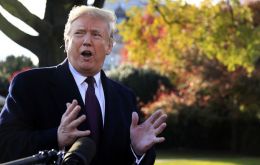
United States Supreme Court Chief Justice John Roberts has taken the extraordinary step of rebuking President Donald Trump's criticism of a federal judge. Mr. Trump on Tuesday called a jurist who ruled against his asylum policy an “Obama judge”.
-
Friday, November 9th 2018 - 07:15 UTC
CNN correspondent banned from White House for challenging Trump
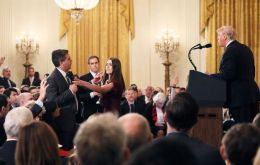
President Donald Trump's ongoing feud with Jim Acosta, CNN's chief White House correspondent, boiled over on Wednesday, with Trump verbally berating the journalist before the White House ultimately suspended his press access.
-
Thursday, November 1st 2018 - 08:46 UTC
Trump makes immigration and birthrights leading issue of midterm election next week

President Donald Trump is intensifying his hard line immigration rhetoric heading into the midterm elections, 6 November, declaring that he wants to order an end to the constitutional right to citizenship for babies of non-citizens and unauthorized immigrants born on US soil.
-
Friday, September 7th 2018 - 09:22 UTC
Latin American countries will receive Venezuelan migrants even with expired documents

Eleven Latin American countries say that they have agreed to allow Venezuelans leaving their homeland to enter their countries even if their travel documents have expired. More than 2.3 million Venezuelans have fled the country's hyperinflation and severe shortages, but many do not have valid passports because renewing them can take years.
-
Thursday, August 30th 2018 - 09:11 UTC
Emergency in Brazil: 700/800 Venezuelans cross the border daily, claims Temer
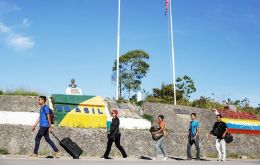
The Brazilian government may restrict entrance of Venezuelans at the border in the remote northwestern state of Roraima, President Michel Temer said on Wednesday, after a flood of migrants has strained local services and sparked violence with residents.
-
Tuesday, August 28th 2018 - 08:30 UTC
Exodus of Venezuelan migrants comparable to “Mediterranean refugees” events, says UN office

The exodus of migrants from Venezuela is building towards a “crisis moment” comparable to events involving refugees in the Mediterranean, the United Nations migration agency said.
-
Thursday, August 23rd 2018 - 09:12 UTC
The democratic challenge to dictatorships and xenophobia in Latin America
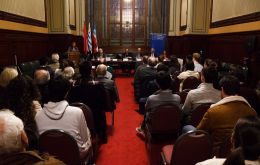
During the conference entitled “The democratic challenge to the autocracies of the 21st century in Latin America,” organized by the Center for the Opening and Development of Latin America (CADAL) on Tuesday at the Senate of Uruguay, the Government of Venezuela was described as a “dictatorship” and it was exhorted that the democratic governments of the region, especially the Uruguayan government, not be indifferent or “accomplices” against today’s Latin America’s autocratic governments.
-
Sunday, May 20th 2018 - 19:55 UTC
Venezuelans in Uruguay demonstrated by denouncing “fraudulent” presidential elections
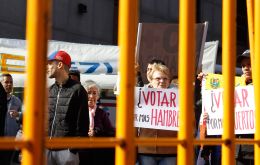
Little by little, around noon on this Sunday, Venezuelans living in Uruguay gathered in front of the Venezuelan embassy in Montevideo to protest against what they consider “unfair and fraudulent” presidential elections. The diplomatic office, where an electoral table was installed where 405 Venezuelans living in Uruguay would be authorized to vote by the electoral register, was fenced with by the police for fear of violent attacks.
